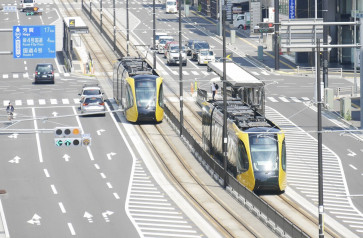Popular Reads
Top Results
Can't find what you're looking for?
View all search resultsPopular Reads
Top Results
Can't find what you're looking for?
View all search resultsFrequency of accidents decreasing amid stricter regulations
The number of occupational accidents nationwide has shown a downward trend over the past four years, said the Minister of Manpower at the Expo on Work Health and Safety (K3) in Jakarta on Tuesday
Change text size
Gift Premium Articles
to Anyone
T
he number of occupational accidents nationwide has shown a downward trend over the past four years, said the Minister of Manpower at the Expo on Work Health and Safety (K3) in Jakarta on Tuesday.
Occupational accidents have dropped from almost 100,000 in 2005 to 95,500 in 2006, 65,475 in 2007 and finally just 37,000 as of September 2008.
"Of all accidents, 66 percent occurred on the streets, either on the way to or from work," Minister Erman Suparno said.
"The decrease of occupational accidents in the country were more or less due to a stricter approach," he added.
"The application of law enforcement should be the approach for work safety, not only through regulations and administrative measures. Criminal laws should be considered too."
The fact Indonesia, along with Singapore, has been appointed caretaker for K3 implementation projects in the Asia-Europe cooperation has triggered the government to work harder to implement these measures domestically, he said.
The two-day Expo on Work Health and Safety held at the Ministry of Manpower showcased dozens of safety devices, from safety helmets and shoes to fire safety systems and ambulance services.
The minister said protecting worker health and safety was not a burden but a preventative measure for increasing productivity.
"Health and safety measures are in place to increase efficiency, and employers from both the union and corporate sectors should integrate them into their work culture."
K3 rights belong to every worker and should be provided by a specific management unit at each company, Erman said.
"The management of K3 rights should be formed systematically, not partially or when an accident occurs," he said.
"And the informal sectors should also be aware of these safety measures. Food vendors and home industries should develop a culture of work safety."
He said the government is fully aware of the importance of K3, with an awareness month held annually to educate stakeholders about there importance.
In 2007, the government set a target to decrease the number of work accidents by 50 percent every year.










